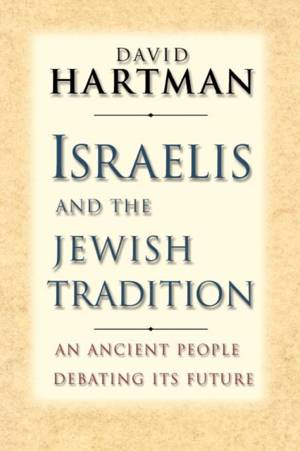
- Afhalen na 1 uur in een winkel met voorraad
- Gratis thuislevering in België vanaf € 30
- Ruim aanbod met 7 miljoen producten
- Afhalen na 1 uur in een winkel met voorraad
- Gratis thuislevering in België vanaf € 30
- Ruim aanbod met 7 miljoen producten
Zoeken
€ 52,95
+ 105 punten
Omschrijving
In this powerful book one of the most important Jewish thinkers in the world today grapples with issues that increasingly divide Israel's secular Jewish community from its religious Zionists. Addressing the concerns of both communities from the point of view of one who is deeply committed to religious pluralism, David Hartman suggests a more inclusive and inviting framework for the modern Israeli engagement of the Jewish tradition. He offers a new understanding of what it means to be Jewish-one which is neither assimilationist nor backward-looking, and one that enables different Jewish groups to celebrate their own traditions without demonizing or patronizing others. In a world polarized between religious and secular and caught within a sectarian denominationalism, Hartman shows the way to build bridges of understanding. The book explores the philosophies of two major Jewish thinkers of the Middle Ages, Yehuda Halevi and Moses Maimonides. A careful analysis of Maimonides' approach to Judaism shows that messianism is not the predominant organizing principle that makes Judaism intelligible and significant, Hartman contends. He argues against Halevi's triumphalism and in favor of using the Sinai covenant for evaluating the religious significance of Israel, for this approach gives meaning to Zionists' religious commitments while also empowering secular Israelis to reengage with the Jewish tradition.
Specificaties
Betrokkenen
- Auteur(s):
- Uitgeverij:
Inhoud
- Aantal bladzijden:
- 192
- Taal:
- Engels
- Reeks:
Eigenschappen
- Productcode (EAN):
- 9780300184112
- Verschijningsdatum:
- 30/11/2011
- Uitvoering:
- Paperback
- Formaat:
- Trade paperback (VS)
- Afmetingen:
- 152 mm x 229 mm
- Gewicht:
- 290 g

Alleen bij Standaard Boekhandel
+ 105 punten op je klantenkaart van Standaard Boekhandel
Beoordelingen
We publiceren alleen reviews die voldoen aan de voorwaarden voor reviews. Bekijk onze voorwaarden voor reviews.











